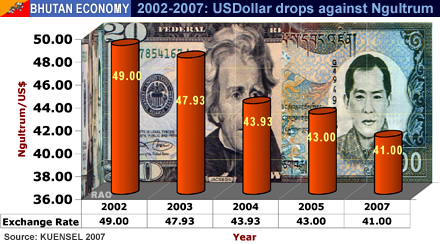 |
Bhutan's
Economy |
|
 |
Bhutan Information |
|
|
 |
|
Ngultrum
vis-a-vis the USDollar 2007
|
 |
 |
| Third
country imports is becoming cheaper for Bhutan with the US dollar continuing
its slide, a trend that started way back in 2002.
According
to the Bhutan National Bank's exchange rates the US dollar had plunged
to a low of 41 against the Ngultrum as of May 14.
From
Nu. 49.00 a dollar in 2002 it dropped to Nu.47.93 in 2003. |
|
By
the end of the 2003-04 fiscal year the US dollar averaged 43.93 Ngultrums.
In March 2005 the Ngultrum had appreciated to Nu. 43.00 a dollar.
According
to some analysts, the sliding dollar could hurt Bhutan's exports but it
would also make debt servicing on loans easier for the government.
Some
Bhutanese in the fruit export business are worried with the apple export
season two months away.
 |
| A
real estate developer in Thimphu said that some Bhutanese working abroad
who had booked to buy his apartments were now asking for more time to make
payments. "They had agreed to buy the flats when the dollar was higher
but now they realise that they have to pay more," he said.
|
|
At
a macro economic level the appreciating Ngultrum is not expected to have
much of an impact on both exports and imports because Bhutan's largest
trading partner is India and trading between the two countries hardly involved
hard currency.
However,
the Ngultrum's gain against the US dollar has more to do with India's economy
which has seen unprecedented growth in the past few years particularly
in the IT sector and huge inflows of investment capital. The Ngultrum is
pegged at par to the Indian Rupee and follows the changes in its exchange
rate. So any gain in the Rupee brings about a gain in the Ngultrum against
the dollar.
In
2005, 87.6 percent of Bhutan's exports were to India. Of the total imports
75.1 percent were from India.
The
appreciating Rupee against the dollar has raised a lot of concern in India
where inflation has risen beyond five percent and some economists have
warned of the economy over heating.
According
to a news report in the Times of India the commerce minister, Kamal Nath,
had requested PM Manmohan Singh to intervene on the appreciating Rupee.
The
concern has been centred around the impact of the appreciating value of
the Rupee on Indian exporters.
According
to the report the Rupee has touched a nine-year high of Rs 40.55 to a dollar
on Monday and exporters have seen their margins erode by 10 percent in
the past year.
Besides
the Rupee and Ngultrum, most major currencies of the world have also been
moving up against the weakening dollar, particularly the Euro and the Thai
Baht.
 |
| This article was contributed by Phuntsho Wangdi KUENSEL, Bhutan's National Newspaper,
2007 |
 |
|
Links
|
 |
 |
 |
External
links |
|





